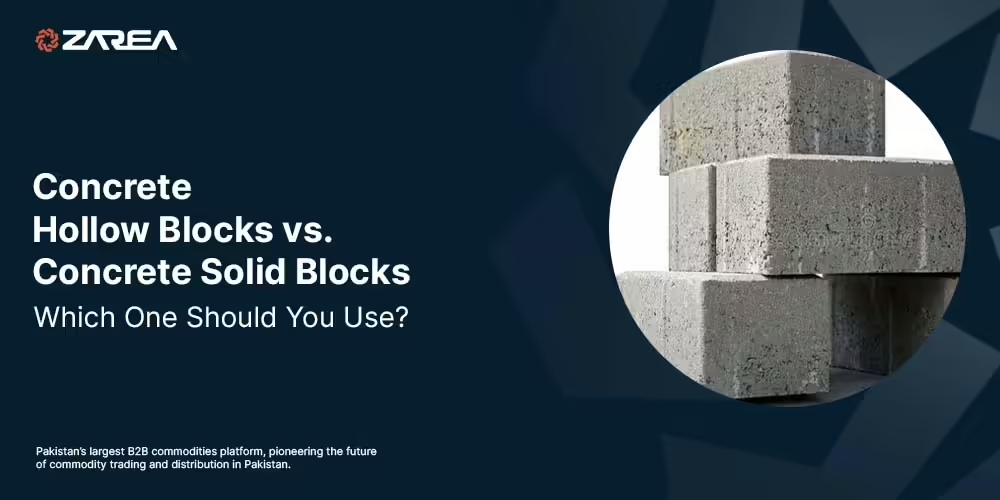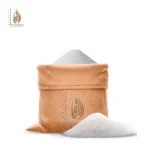The construction industry has slowly transitioned from brick masonry to concrete masonry. This transition is owed to several properties of Concrete, which gives it an edge over other types of construction materials. Concrete has a central importance in the construction industry. As discussed earlier, Concrete has diverse usage due to its advantages. Concrete blocks are used to make the structure of the building sturdy.
Depending upon its application, it is usually made up of cement, gravel, water, and other materials. Concrete block is also known as Concrete Masonry Unit (CMU). If you want to learn about concrete in more detail, then you can read it here. This blog will explore two of the most commonly used concrete blocks, i.e., concrete hollow blocks and solid concrete blocks.
If you are confused about which one to use, you are at the right place because Zarea.pk is here to answer your question. Now let’s go through each of these types of concrete blocks.
Solid Concrete Blocks Specifications
Solid concrete block has high compressive strength. It is resistant to the effects of abrasion and weathering. A solid concrete block is moldable into various shapes and sizes. It not only provides high stability but can also withstand temperatures as high as 400 degrees celsius. There are no cavities in solid concrete blocks. Even the voids present in solid concrete blocks do not account for more than 25% of the total cross-sectional area.
Solid concrete blocks are heavy-weighted. They are composed of lean mixes. Given its elemental composition, solid concrete blocks are easier ones to manufacture. In any infrastructure, they are used as primary structural elements. One of the disadvantages of solid concrete blocks is that it is a bad thermal insulator. Alo it is not cost-efficient. It takes a considerable amount of mixture to manufacture solid concrete blocks, which makes it expensive.
The average size of this type of concrete block is 400 mm × 200 mm × 150 mm. Solid concrete blocks are used in the construction of dams and bridges. These high-density blocks are 55% solid. This block has sharp edges which are at right angles to each other.
Hollow Concrete Blocks specifications
One of the advantages of hollow concrete blocks is that they can be manufactured in bigger sizes than solid concrete blocks. Hollow concrete blocks are not only lighter in weight but also require less working time. Some of the properties of hollow concrete blocks include good thermal insulation. Hollow blocks have cavities inside them that can be used for plumbing and electric installation.
Hollow blocks can be made earth-quake resistant by filling the voids with steel bars. The production of hollow blocks is much cheaper than solid concrete blocks. It is even lower than the production of fired bricks. These blocks also consume less mortar. The holes inside hollow blocks take up to 50% of their cross-sectional composition. These holes provide good sound insulation. Hollow blocks are also easier to carry and transport even when stacked together as compared to solid blocks.
The average size of hollow blocks is 400 mm × 200 mm × 190 mm. Unlike solid concrete blocks, these hollow blocks are made up of rich and fine mixtures. The proportion of fine aggregates is usually 60%, while the coarse aggregate proportion is usually 40%. Hollow blocks are most commonly used in building and portioning structural walls in house construction.
The hollow concrete blocks can be classified into four main grades ( mainly divided based on their density), which are briefly explained as follows:
Grade A hollow concrete block
The density of Grade A hollow concrete block is around 1500 kg/m3. This Grade of hollow concrete block is used in load-bearing units. The minimum compressive strength of this Grade is 3.5, 4.5, 5.5, and 7.0 N/mm2.
Grade B hollow concrete blocks
The density of Grade B hollow concrete blocks is at least 1000 kg/m3. The minimum compressive strength of this block is 2.0, 3.0, and 5.0 N/mm2. Just like Grade A, this Grade is also used for load-bearing purposes.
Grade C hollow concrete blocks
The density of Grade C hollow concrete blocks is also at least 1000 kg/m3. This Grade is used in non-load bearing units, unlike Grade A and Grade B. The minimum compressive strength of Grade C is 1.5 N/mm2.
Grade D hollow concrete blocks
The density of Grade D hollow concrete blocks is usually not less than 1800 kg/m3. This Grade has a minimum compressive strength up to 4.0 and 5.0 N/mm2.
Which one is the winner?
Both types of blocks have their advantages; however, in some cases, the properties of hollow concrete blocks outweigh that of solid blocks. But that doesn’t mean we can overlook the utility factors of solid concrete blocks. Both these blocks have their usage. When used for the right purpose, both these blocks can provide excellent stability to the building structure. Solid blocks are load-bearing in nature, while on the other hand, hollow blocks are more versatile.
To learn more about construction materials, construction material prices, and stay up-to-date about the construction industry, visit Zarea.pk blog is the best construction blog in Pakistan.
Zarea.pk ensures that it provides high-end construction materials with unmatched quality. Our online platform’s construction materials have the best base materials prepared from the most precise methods. The companies we have on-board assert a high capacity of manufacturing. We ensure that each enlisted company has a standard compliance certificate that verifies the quality, quantity, and specifications of their construction materials. This is why you will find the construction materials at Zarea.pk are from top-notch brands.
Now you can shop online all the high-quality construction materials in one go. Our rate list will give you insightful information that will cut short the tricky price comparison process in the market.
For the first time in Pakistan, Zarea.pk is offering digital payment solutions for the online buying of construction materials. You can not only browse numerous options for construction materials at Zarea.pk but can also get all the materials delivered to your doorstep. With the technical expertise of Zarea.pk procurement of construction materials doesn’t seem like a complicated process anymore. You can also compare daily construction material prices in Pakistan at Zarea.pk.
































